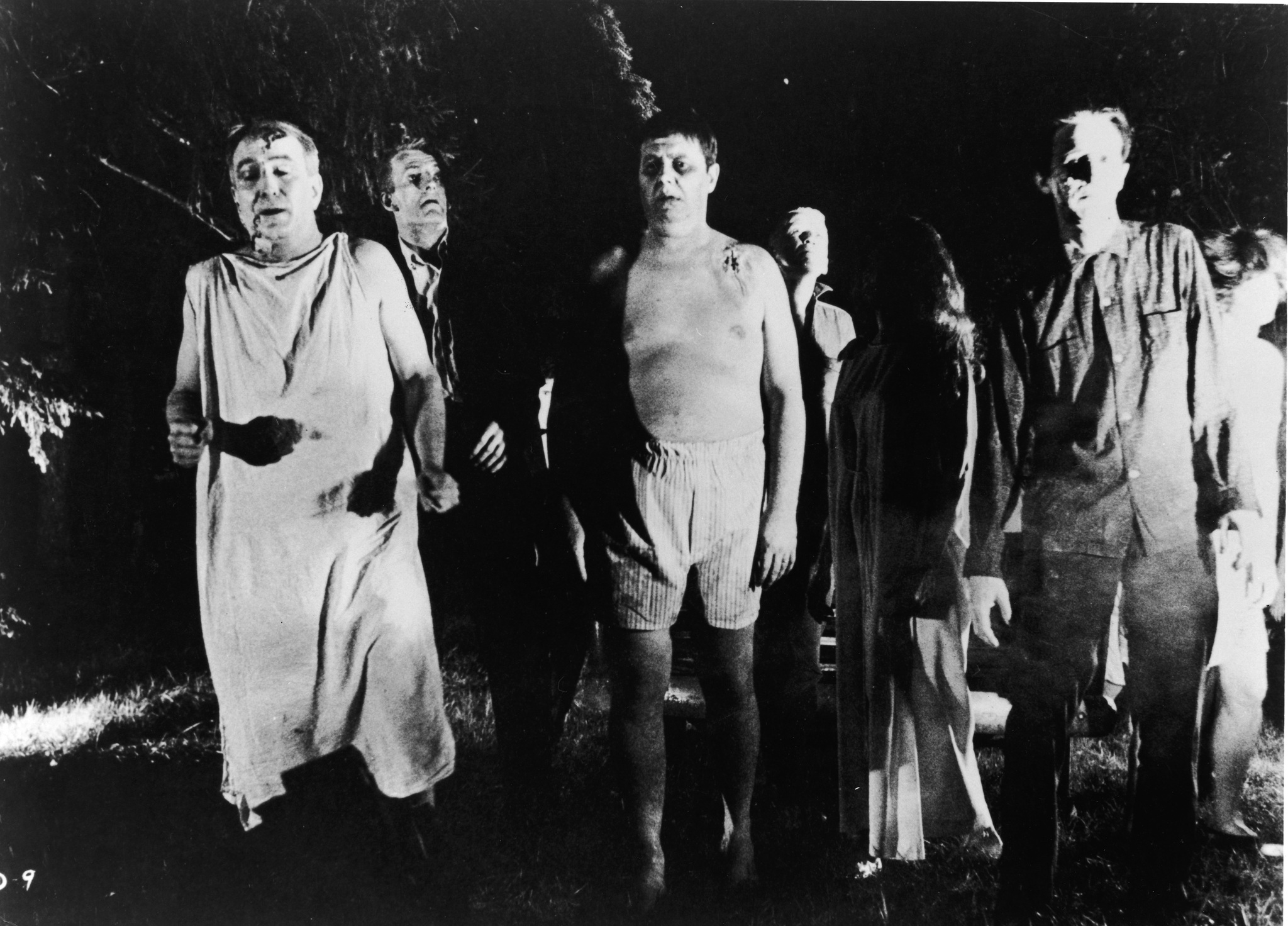|
Oh! My Zombie Mermaid
is a 2004 Japanese action comedy film directed by Naoki Kudo, written by Naoki Kudo and Izō Hashimoto, and starring Shinya Hashimoto, Sonim, Shirō Sano, and Nicholas Pettas. Hashimoto plays a professional wrestler whose wife involuntarily turns into a mermaid. Plot Shishioh, a popular and successful professional wrestler, builds a large mansion for his wife Asami and their kids. During the housewarming party, Ichijo, an angry competitor, causes a riot that destroys the house. Asami is hospitalized, where she contracts a rare virus that slowly transforms her into a mermaid. Desperate for money to finance his new house and find a cure for Asami, Shishioh agrees to a reality TV show in which he wrestles several competitors in a haunted house. His opponents turn out to be homicidal killers and include a zombie among them. Eventually, Shishioh learns that the television producer infected Asami with an experimental virus in order to get him to compete. Cast * Shinya Hashimo ... [...More Info...] [...Related Items...] OR: [Wikipedia] [Google] [Baidu] |
Shinya Hashimoto
was a Japanese professional wrestler, promoter and actor. Along with Masahiro Chono and Keiji Mutoh, Hashimoto was dubbed one of the "Three Musketeers" that began competing in New Japan Pro-Wrestling (NJPW) in the mid-1980s and dominated the promotion in the 1990s. He is one of three wrestlers (the others being Keiji Mutoh and Satoshi Kojima) that have held the NWA World Heavyweight Championship, the Triple Crown Heavyweight Championship and the IWGP Heavyweight Championship and is an overall five-time world champion. Professional wrestling career Early years (1984–1988) Hashimoto grew up in Toki City in Gifu and began training in judo and karate in his late teens. His training helped him in his transition to professional wrestling, as he joined the NJPW Dojo in April 1984. He made his debut for NJPW in September 1984 at the age of 19, wrestling against Tatsutoshi Goto. Hashimoto worked on becoming a skilled wrestler over the next few years, traveling whenever necess ... [...More Info...] [...Related Items...] OR: [Wikipedia] [Google] [Baidu] |
Peter Dendle
Peter Dendle is a professor of English at Penn State Mont Alto, teaching classes on folklore, 20th and 21st century representations of the Middle Ages, Old and Middle English (language and literature), and the monstrous (in film, folklore, and society). Dendle has written books and articles on a number of topics, including cryptozoology, philology, the demonic in literature, zombie movies, and Medieval plants and medicine. His work on zombies was featured by NPR. Career His education includes a B.A. in English and Philosophy (1990) and an M.A. in Philosophy (1993), both from the University of Kentucky, as well as an M.A. in English from Yale (1991) and a PhD in English from the University of Toronto (1998). In 2007, National Geographic featured some of the research results from Dendle's monograph ''Demon Possession in Anglo-Saxon England''. Other recent works include peer-reviewed articles on cryptozoology, medieval charms, demon possession, gender in Old Norse and Anglo-Saxon ... [...More Info...] [...Related Items...] OR: [Wikipedia] [Google] [Baidu] |
Japanese Sports Comedy Films
Japanese may refer to: * Something from or related to Japan, an island country in East Asia * Japanese language, spoken mainly in Japan * Japanese people, the ethnic group that identifies with Japan through ancestry or culture ** Japanese diaspora, Japanese emigrants and their descendants around the world * Japanese citizens, nationals of Japan under Japanese nationality law ** Foreign-born Japanese, naturalized citizens of Japan * Japanese writing system, consisting of kanji and kana * Japanese cuisine, the food and food culture of Japan See also * List of Japanese people * * Japonica (other) * Japonicum * Japonicus * Japanese studies {{disambiguation Language and nationality disambiguation pages ... [...More Info...] [...Related Items...] OR: [Wikipedia] [Google] [Baidu] |
Zombie Comedy Films
A zombie (Haitian French: , ht, zonbi) is a mythological undead corporeal revenant created through the reanimation of a corpse. Zombies are most commonly found in horror and fantasy genre works. The term comes from Haitian folklore, in which a ''zombie'' is a dead body reanimated through various methods, most commonly magic like voodoo. Modern media depictions of the reanimation of the dead often do not involve magic but rather science fictional methods such as carriers, radiation, mental diseases, vectors, pathogens, parasites, scientific accidents, etc. The English word "zombie" was first recorded in 1819, in a history of Brazil by the poet Robert Southey, in the form of "zombi"."Zombie" in |
Professional Wrestling Films
A professional is a member of a profession or any person who works in a specified professional activity. The term also describes the standards of education and training that prepare members of the profession with the particular knowledge and skills necessary to perform their specific role within that profession. In addition, most professionals are subject to strict codes of conduct, enshrining rigorous ethical and moral obligations. Professional standards of practice and ethics for a particular field are typically agreed upon and maintained through widely recognized professional associations, such as the IEEE. Some definitions of "professional" limit this term to those professions that serve some important aspect of public interest and the general good of society.Sullivan, William M. (2nd ed. 2005). ''Work and Integrity: The Crisis and Promise of Professionalism in America''. Jossey Bass.Gardner, Howard and Shulman, Lee S., The Professions in America Today: Crucial but Fragile. Da ... [...More Info...] [...Related Items...] OR: [Wikipedia] [Google] [Baidu] |
Films About Mermaids
A film also called a movie, motion picture, moving picture, picture, photoplay or (slang) flick is a work of visual art that simulates experiences and otherwise communicates ideas, stories, perceptions, feelings, beauty, or atmosphere through the use of moving images. These images are generally accompanied by sound and, more rarely, other sensory stimulations. The word "cinema", short for cinematography, is often used to refer to filmmaking and the film industry, and to the art form that is the result of it. Recording and transmission of film The moving images of a film are created by photographing actual scenes with a motion-picture camera, by photographing drawings or miniature models using traditional animation techniques, by means of CGI and computer animation, or by a combination of some or all of these techniques, and other visual effects. Before the introduction of digital production, series of still images were recorded on a strip of chemically sensitize ... [...More Info...] [...Related Items...] OR: [Wikipedia] [Google] [Baidu] |
Japanese Action Comedy Films
Japanese may refer to: * Something from or related to Japan, an island country in East Asia * Japanese language, spoken mainly in Japan * Japanese people, the ethnic group that identifies with Japan through ancestry or culture ** Japanese diaspora, Japanese emigrants and their descendants around the world * Japanese citizens, nationals of Japan under Japanese nationality law ** Foreign-born Japanese, naturalized citizens of Japan * Japanese writing system, consisting of kanji and kana * Japanese cuisine, the food and food culture of Japan See also * List of Japanese people * * Japonica (other) * Japonicum * Japonicus * Japanese studies Japanese studies ( Japanese: ) or Japan studies (sometimes Japanology in Europe), is a sub-field of area studies or East Asian studies involved in social sciences and humanities research on Japan. It incorporates fields such as the study of Japan ... {{disambiguation Language and nationality disambiguation pages ... [...More Info...] [...Related Items...] OR: [Wikipedia] [Google] [Baidu] |
2000s Japanese-language Films
S, or s, is the nineteenth letter in the Latin alphabet, used in the modern English alphabet, the alphabets of other western European languages and others worldwide. Its name in English is ''ess'' (pronounced ), plural ''esses''. History Origin Northwest Semitic šîn represented a voiceless postalveolar fricative (as in 'ip'). It originated most likely as a pictogram of a tooth () and represented the phoneme via the acrophonic principle. Ancient Greek did not have a phoneme, so the derived Greek letter sigma () came to represent the voiceless alveolar sibilant . While the letter shape Σ continues Phoenician ''šîn'', its name ''sigma'' is taken from the letter '' samekh'', while the shape and position of ''samekh'' but name of ''šîn'' is continued in the '' xi''. Within Greek, the name of ''sigma'' was influenced by its association with the Greek word (earlier ) "to hiss". The original name of the letter "sigma" may have been ''san'', but due to the ... [...More Info...] [...Related Items...] OR: [Wikipedia] [Google] [Baidu] |
2000s Action Comedy Films
S, or s, is the nineteenth letter in the Latin alphabet, used in the modern English alphabet, the alphabets of other western European languages and others worldwide. Its name in English is ''ess'' (pronounced ), plural ''esses''. History Origin Northwest Semitic šîn represented a voiceless postalveolar fricative (as in 'ip'). It originated most likely as a pictogram of a tooth () and represented the phoneme via the acrophonic principle. Ancient Greek did not have a phoneme, so the derived Greek letter sigma () came to represent the voiceless alveolar sibilant . While the letter shape Σ continues Phoenician ''šîn'', its name ''sigma'' is taken from the letter ''samekh'', while the shape and position of ''samekh'' but name of ''šîn'' is continued in the '' xi''. Within Greek, the name of ''sigma'' was influenced by its association with the Greek word (earlier ) "to hiss". The original name of the letter "sigma" may have been ''san'', but due to the complic ... [...More Info...] [...Related Items...] OR: [Wikipedia] [Google] [Baidu] |
2004 Films
2004 in film is an overview of events, including the highest-grossing films, award ceremonies, festivals, a list of country-specific lists of films released, notable deaths and film debuts. ''Shrek 2'' was the year's top-grossing film, and '' Million Dollar Baby'' won the Academy Award for Best Picture. Evaluation of the year Renowned American film critic and professor Emanuel Levy described 2004 as "a banner year for actors, particularly men." He went on to emphasize, "I can't think of another year in which there were so many good performances, in every genre. It was a year in which we saw the entire spectrum of demographics displayed on the big screen, from vet actors such as Clint Eastwood and Morgan Freeman, to seniors such as Pacino, De Niro, and Hoffman, to newcomers such as Topher Grace. As always, though, the center of the male acting pyramid is occupied by actors in their forties and fifties, such as Sean Penn, Johnny Depp, Liam Neeson, Kevin Kline, Don Cheadle ... [...More Info...] [...Related Items...] OR: [Wikipedia] [Google] [Baidu] |
McFarland Publishing
McFarland & Company, Inc., is an American independent book publisher based in Jefferson, North Carolina, that specializes in academic and reference works, as well as general-interest adult nonfiction. Its president is Rhonda Herman. Its former president and current editor-in-chief is Robert Franklin, who founded the company in 1979. McFarland employs a staff of about 50, and had published 7,800 titles. McFarland's initial print runs average 600 copies per book. Subject matter McFarland & Company focuses mainly on selling to libraries. It also utilizes direct mailing to connect with enthusiasts in niche categories. The company is known for its sports literature, especially baseball history, as well as books about chess, military history, and film. In 2007, the ''Mountain Times'' wrote that McFarland publishes about 275 scholarly monographs and reference book titles a year; Robert Lee Brewer reported in 2015 that the number is about 350. List of scholarly journals The followi ... [...More Info...] [...Related Items...] OR: [Wikipedia] [Google] [Baidu] |



